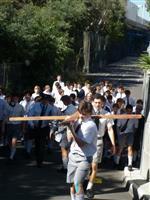Edmund Rice was a victualler. You don’t hear the word much these days. It means that he sold supplies to ships getting ready to leave the port of Waterford on long voyages to heaven knows where. Victuals are things you eat: Edmund’s specialty was supplying food to ships, a career which brought to the waterside lessons he’d learnt in his rural upbringing.
The image of supplying ships is a good one to describe a lot of what we try to do at St Kevin’s and especially for understanding the work of the ministry team. We’d like our boys to take on board the right kind of supplies to feed them on the long and unpredictable voyage of life. This makes for an inventory of things you can’t buy in shops: compassion, humility, honesty, prayerfulness, hope and a deep commitment to the liberation of the whole human family. These qualities are victuals: they nourish and sustain us at the deepest level. They are all signs of God’s presence.
One way of looking at Edmund Rice Education is to think of it as something which grows in many directions but which has four touchstones. They are:

Everyone is welcome to Mass on Friday at 8.10am (during the term) in the Chapel of St Kevin.
Often one of our senior students presents a reflection which expresses something profound from within the Edmund Rice tradition. Here is an example:

Late last year, the father of a close friend of mine lost his battle with cancer. Her mum was left in a very tough situation to raise four kids by herself, two of them below the age of three. As things got tough for my friend and her family, the local parish came together to help lift them out of their difficult situation. Money was raised through a fete and everybody helped out around their house, looking after the two young boys, cooking meals and even taking the kids out for the day to give the mother some much needed time alone. All this gave the family a strong sense of belonging within the community, letting them know they were not alone at all. This is the message of the Gospel. We are not alone.
Religion and faith in general are seen by some as archaic today, something that does not belong in this era of science and discovery. People need to prove things, testing, collating and forming logical conclusions before they can invest in faith; however, knowing something exists is not the same as believing. Trying to prove the existence of God is like trying to prove the existence of love, we cannot see tangible proof of these concepts, yet we see evidence of their existence by the tracks they leave behind, like the footprints of a bird in wet sand. We struggle to come up with the answers for the hard questions of life: What is the purpose of life? Does God exist? Is there an afterlife? But at the end of the day, with our questions still unanswered, we still have faith, we still believe. This is the beauty of religion. Not a belief without proof, but a trust without reservation. As Jesus stated in John’s Gospel: ‘blessed are those who have not seen and yet believe.’